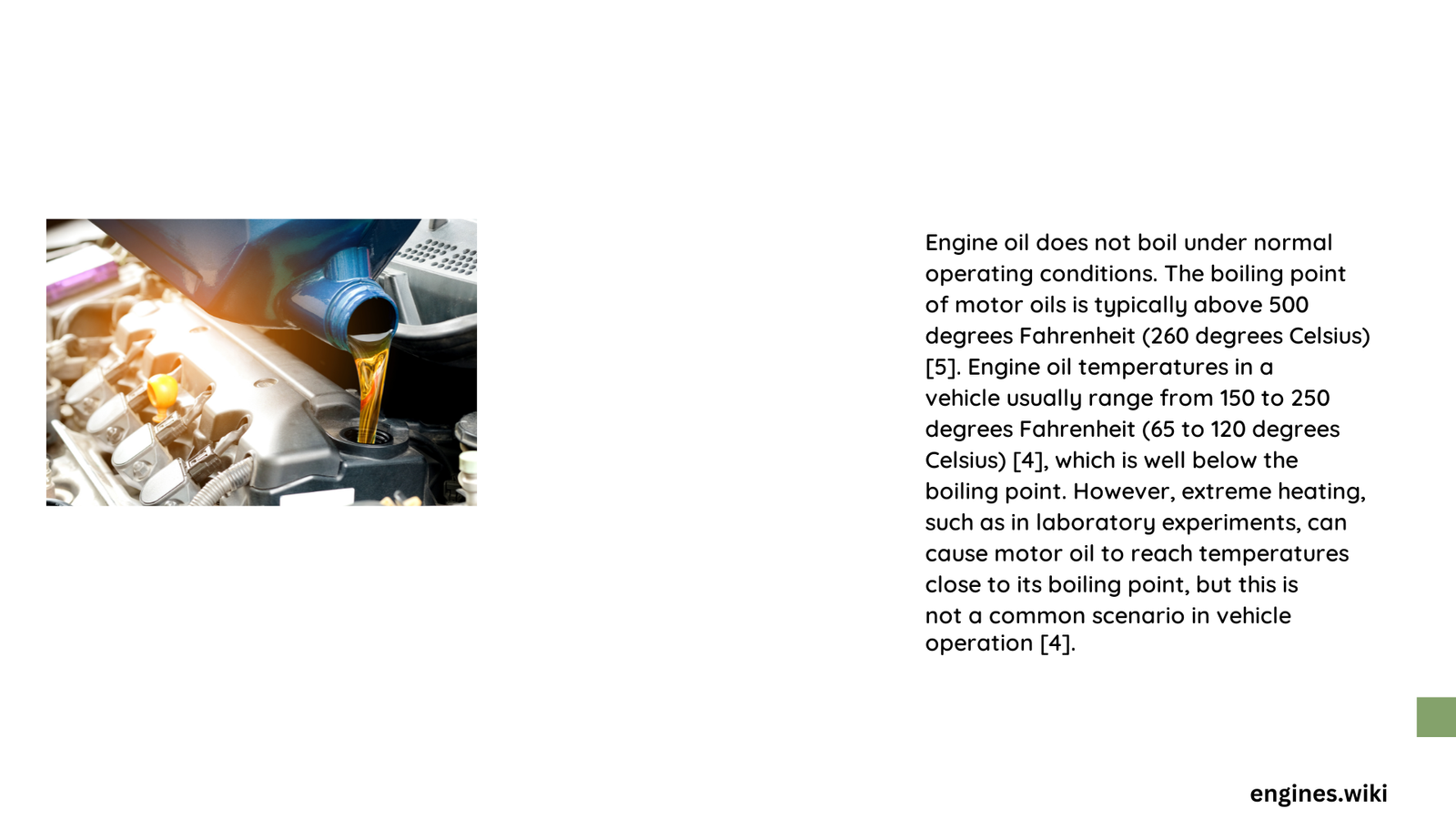Engine oils are complex lubricants designed to withstand extreme temperatures, but the question remains: does engine oil boil? While most automotive enthusiasts might assume oil boils under high heat, the reality is far more nuanced. Modern engine oils are engineered with sophisticated molecular structures that prevent boiling during typical engine operation, maintaining critical lubrication properties even under intense thermal stress.
What Determines Engine Oil Boiling Point?
Engine oils are composed of complex hydrocarbon molecules with remarkably high boiling points. Let’s explore the key factors that influence oil boiling characteristics:
Chemical Composition Matters
| Oil Type | Average Boiling Point | Thermal Stability |
|---|---|---|
| Conventional Oil | 572°F – 600°F | Moderate |
| Synthetic Oil | 600°F – 700°F | High |
| Synthetic Blend | 550°F – 650°F | Moderate-High |
Why Don’t Engine Oils Typically Boil?
Several critical factors prevent engine oil from reaching its boiling point:
- Low Vapor Pressure: Engine oils have extremely low vapor pressures
- High Molecular Weight: Hydrocarbons in oil resist rapid vaporization
- Engineered Thermal Stability: Modern oils are designed to maintain performance
Temperature Thresholds for Engine Oil

Most engine oils experience performance changes well before reaching boiling points:
- Normal Operating Temperature: 195°F – 220°F
- Performance Degradation Begins: Around 240°F
- Critical Temperature Threshold: 250°F – 260°F
What Happens When Oil Approaches Critical Temperatures?
When engine oil experiences extreme heat, several critical transformations occur:
- Viscosity Reduction: Oil becomes thinner
- Lubrication Efficiency Drops: Decreased protective capabilities
- Potential Chemical Breakdown: Risk of oxidation increases
Practical Implications for Vehicle Owners
Vehicle owners should understand that while engine oil doesn’t technically “boil” under normal circumstances, temperature management remains crucial:
- Regular Oil Changes: Maintain oil quality
- Monitor Engine Temperature: Use temperature gauges
- Choose High-Quality Oils: Select oils with superior thermal stability
Factors Influencing Oil Temperature
Critical external and internal factors impact oil temperature:
- Engine design
- Driving conditions
- Ambient temperature
- Vehicle maintenance
- Oil viscosity grade
Scientific Perspective on Oil Boiling
From a molecular perspective, engine oils are designed with:
- High Carbon Chain Lengths: 16-20 carbon atoms
- Complex Molecular Structures: Resist rapid vaporization
- Advanced Additive Packages: Enhance thermal resistance
Recommended Practices
- Use manufacturer-recommended oil grades
- Perform regular oil analysis
- Maintain proper cooling systems
- Avoid prolonged high-stress driving conditions
Technical Insights
Key Takeaway: Engine oil does not boil under typical operating conditions. The boiling point far exceeds normal engine temperatures, ensuring consistent lubrication and protection.
Pro Tip: While boiling isn’t a concern, monitoring oil temperature and quality remains essential for optimal engine performance.
References:
– SAE International Oil Temperature Research
– Society of Automotive Engineers Lubrication Guidelines
– American Petroleum Institute Oil Standards
